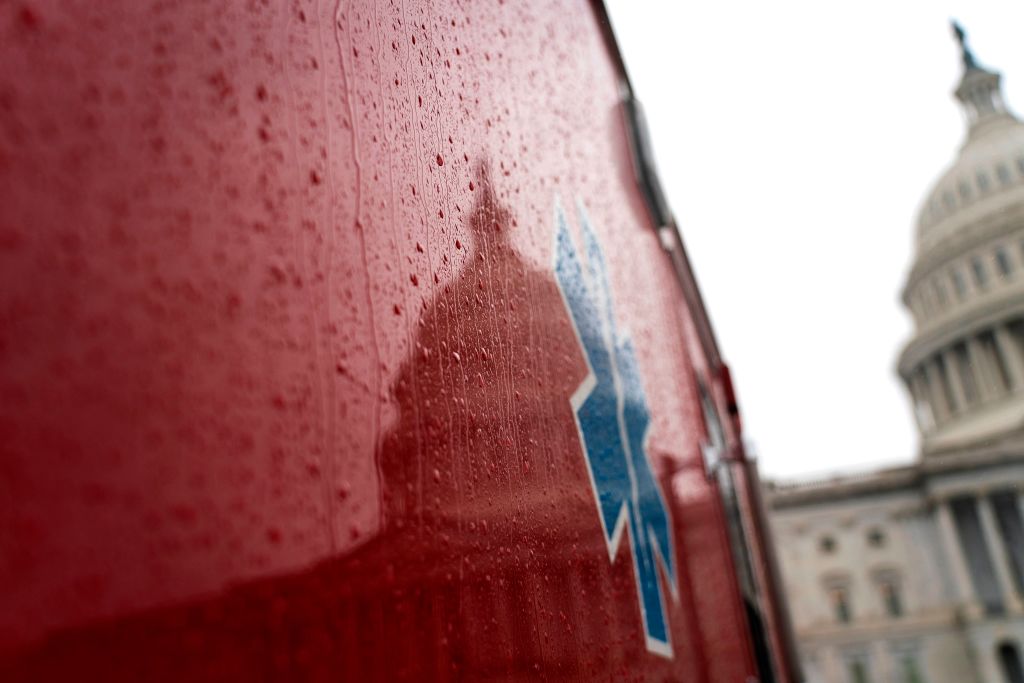Here's how the U.S. government plans to spend $2.2 trillion to save the economy from coronavirus


A free daily email with the biggest news stories of the day – and the best features from TheWeek.com
You are now subscribed
Your newsletter sign-up was successful
Senate and White House negotiators threw together the largest economic rescue bill in modern U.S. history in less than a week, and the final version of the $2.2 trillion package — passed unanimously in the Senate late Wednesday — has a lot of money for a lot of businesses and institutions. The goal of the legislation is to shore up the U.S. economy and civil society during the COVID-19 coronavirus pandemic. Here's where some of that money will go:
Direct cash payments: Most Americans will get checks of up to $1,200 plus $500 per child, at a cost of about $290 billion.
Hospitals: $100 billion is for grants to hospitals and health care providers struggling to purchase critical supplies and losing money from postponed elective surgeries. There's also money for community health centers, Medicare, telehealth, and public health agencies.
The Week
Escape your echo chamber. Get the facts behind the news, plus analysis from multiple perspectives.

Sign up for The Week's Free Newsletters
From our morning news briefing to a weekly Good News Newsletter, get the best of The Week delivered directly to your inbox.
From our morning news briefing to a weekly Good News Newsletter, get the best of The Week delivered directly to your inbox.
Unemployment: The bill sets aside $260 billion to expand unemployment payments to a broader group of workers affected by the pandemic, add 13 weeks of coverage for the unemployed, and boost weekly payments by up to $600.
State and local governments: $150 billion will go to help state and local governments weather the outbreak, including a minimum of $1.5 billion per state and $8 billion for tribal governments. There's another $25 billion in state infrastructure grants.
Small businesses: $377 billion is set aside for zero-interest loans and other payments for businesses with fewer than 500 employees — including nonprofits and individual hotels and restaurants from large chains. The loans will be forgiven if the companies retain their employees and meet other conditions.
Big businesses: The bill has $500 billion for industries hit especially hard by the pandemic. This includes $50 billion for passenger airlines — $25 billion in loans, $25 billion in grants — $8 billion for cargo carriers, and $17 billion for "businesses critical to maintaining national security" (read: Boeing). The other $425 billion is loans allocated through Federal Reserve programs, with some limits on executive compensation and stock buybacks, new oversight mechanisms, and a ban on participation by companies significantly controlled by President Trump, other top administration officials, members of Congress, or their families.
A free daily email with the biggest news stories of the day – and the best features from TheWeek.com
Miscellaneous: The Pentagon receives $10.4 billion, FEMA gets $45 billion, $25 billion goes for food stamps, $25 billion for public transit systems, $31 billion for local schools and colleges, and states get $400 million to prepare for the 2020 elections, including expanding vote-by-mail and polling locations.
Find more details at Politico, The Associated Press, and The Washington Post, and learn more about the fine print at The New York Times.
Peter has worked as a news and culture writer and editor at The Week since the site's launch in 2008. He covers politics, world affairs, religion and cultural currents. His journalism career began as a copy editor at a financial newswire and has included editorial positions at The New York Times Magazine, Facts on File, and Oregon State University.
-
 The Olympic timekeepers keeping the Games on track
The Olympic timekeepers keeping the Games on trackUnder the Radar Swiss watchmaking giant Omega has been at the finish line of every Olympic Games for nearly 100 years
-
 Will increasing tensions with Iran boil over into war?
Will increasing tensions with Iran boil over into war?Today’s Big Question President Donald Trump has recently been threatening the country
-
 Corruption: The spy sheikh and the president
Corruption: The spy sheikh and the presidentFeature Trump is at the center of another scandal
-
 TikTok secures deal to remain in US
TikTok secures deal to remain in USSpeed Read ByteDance will form a US version of the popular video-sharing platform
-
 Unemployment rate ticks up amid fall job losses
Unemployment rate ticks up amid fall job lossesSpeed Read Data released by the Commerce Department indicates ‘one of the weakest American labor markets in years’
-
 US mints final penny after 232-year run
US mints final penny after 232-year runSpeed Read Production of the one-cent coin has ended
-
 Warner Bros. explores sale amid Paramount bids
Warner Bros. explores sale amid Paramount bidsSpeed Read The media giant, home to HBO and DC Studios, has received interest from multiple buying parties
-
 Gold tops $4K per ounce, signaling financial unease
Gold tops $4K per ounce, signaling financial uneaseSpeed Read Investors are worried about President Donald Trump’s trade war
-
 Electronic Arts to go private in record $55B deal
Electronic Arts to go private in record $55B dealspeed read The video game giant is behind ‘The Sims’ and ‘Madden NFL’
-
 New York court tosses Trump's $500M fraud fine
New York court tosses Trump's $500M fraud fineSpeed Read A divided appeals court threw out a hefty penalty against President Trump for fraudulently inflating his wealth
-
 Trump said to seek government stake in Intel
Trump said to seek government stake in IntelSpeed Read The president and Intel CEO Lip-Bu Tan reportedly discussed the proposal at a recent meeting
